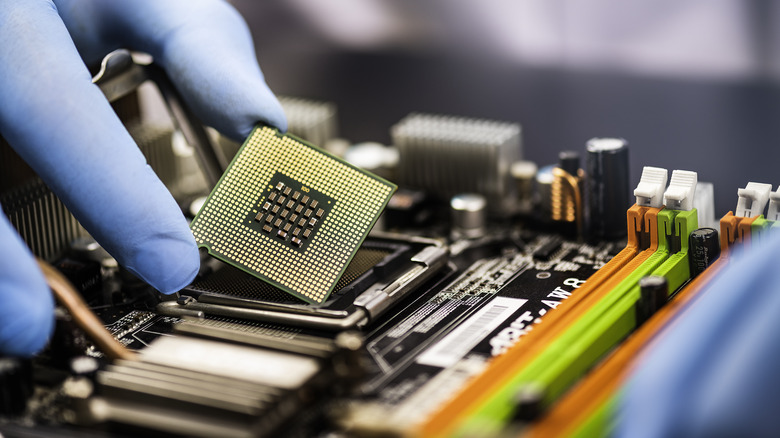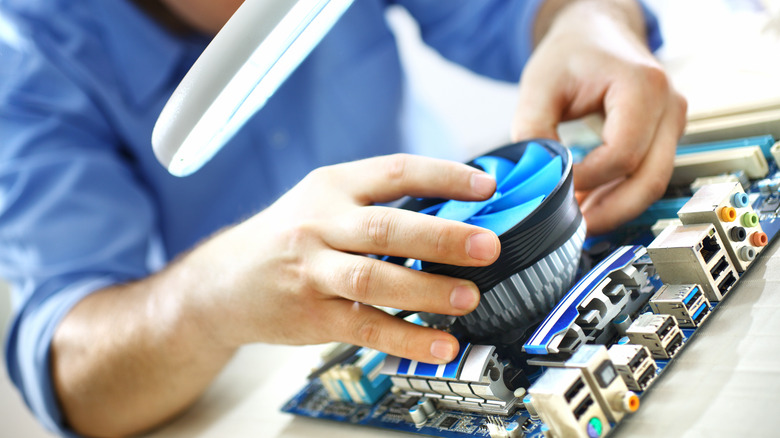What Is A CPU? Everything You Need To Know About Central Processing Units
Everyone has heard that mitochondria are the powerhouse of the cell. Well, the central processing unit (CPU) is the powerhouse of the computer. It's the brain, and without a CPU in your computer, nothing would get done. The CPU of your PC can be found nestled in a socket (usually) near the center of the motherboard. From there, it sends signals to the other pieces of hardware about the different tasks they need to complete.
Gamers and others who build their own computers typically decide whether AMD or Intel is the right CPU for their PC first, as the processor you select determines almost everything else about the computer, including the kind of motherboard that needs to be used. CPUs consist of billions of microscopic transistors that alternate on and off to send a current of electricity to the rest of the computer. Engineers have strived to make transistors smaller and smaller over the years in order to make more powerful CPUs that can complete multiple instructions simultaneously.
A CPU with higher clock speeds and multiple cores performs some CPU-intensive tasks, such as rendering a newly edited video, considerably easier and faster than processors with lower numbers. While a GPU (graphics processing unit) could help with those tasks, the CPU handles the brunt of the work. Here's what you should know about the CPU in your computer.
What are cores, threads, and clock speed?
In the dawn of computers, processors only had a single processing core, built to perform one task at a time. However, as technology advanced, so too did the tasks humans demanded from computers. This meant the number of cores needed to increase. Computers with multiple cores can perform various tasks simultaneously and get them done faster. Now, you would be hard-pressed to find a processor with fewer than two cores. CPUs coming from Intel and AMD these days even have up to 32 cores.
Processors today also perform multithreading, which means each core within the processor splits itself into multiple virtual cores called threads. A dual-core CPU typically has four threads, a quad-core usually has eight, and a 32-core processor normally has 64 threads. Then there's the processor's clock speed, which is just as vital for performance as the cores and threads.
A CPU's clock speed determines how fast each core handles the workload. Its speed is measured in gigahertz (GHz), which denote how many cycles — or steps a computer takes to complete a demand — are tackled in a second. So, for example, a processor with a clock speed of 3GHz completes 3 billion cycles per second. It's worth noting that this doesn't mean that a 3.2GHz processor from 2015 is necessarily better than a 2GHz CPU from 2024. That's because engineers design the architecture of newer processors to be more efficient. As a result, it's better to compare models from the same generation when shopping around for a CPU.
Managing heat from the CPU is important
Heat sinks, liquid cooling, and fans are all things one hears about when building a computer. As is the case with most electronics, computers generate heat — in some cases, a lot of heat. The processor, specifically, can reach temperatures over 100 degrees Fahrenheit while working, although anything under 175 degrees Fahrenheit is typically considered safe. Your CPU might be overheating if you are using intensive programs, and it probably won't surpass 150 degrees Fahrenheit unless its running something like "Call of Duty," Adobe Premiere Pro, or Adobe After Effects.
Some users like to get every bit of power out of their CPU that it has to offer. To do this, they overclock it, improving their computer's performance. While overclocking your gaming PC works, it comes with some risks because in order to get that better performance, the CPU has to pull more power. Using more power means increased temperatures, which will degrade the CPU over time, especially if it performs at such a high load frequently.
Whether it's through liquid or air cooling, the CPU requires something to absorb its heat and redistribute it throughout the computer. Effective heat management is paramount to helping your CPU run better. A CPU cooler is important, but additional fans around the computer tower shouldn't be ignored. Placing fans and choosing the direction those fans blow all help reduce rising temps, extending the life of your processor.


